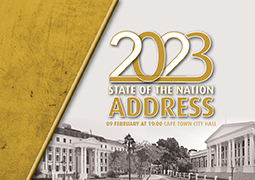
Debating President Cyril Ramaphosa’s State of the Nation Address, Members of Parliament focused largely on the government’s challenges with energy, electricity, crime and unemployment.
The Chief Whip of the National Council of Provinces, Mr Seiso Mohai, said the President’s speech reflects progress on key government priorities and he singled out the government’s infrastructure investment drive for its potential to stimulate economic growth. However, Mr Mohai admitted that non-expenditure of infrastructure grants, the lack of financial and projects plans and municipal management threaten service delivery imperatives.
Reflecting on the soaring crime statistics, Mr Andrew Whitfield of the Democratic Alliance mentioned that when the President first took office he undertook to halve the crime rate. However, murder has since gone up by 20 per cent, mass killings shock communities and the crime centre hotline is dysfunctional. “There is a victim at the end of the unanswered calls. If these problems are not answered, your words will remain meaningless.”
The President of South African Local Government Association, Mr Bheki Stofile, focused his contribution to the debate on the effect coalitions are having on municipal government. “Leaders of these coalitions serve their political interests rather than of the public. They are about gains and as such they hinder service delivery. And often, coalitions fail when there is disgruntlement about how a political cake should be cut and who should benefit. This is done to serve the interest of a political patronage, rather than the needs of the people.” This has to be addressed if municipalities are to remain the agents of efficient service delivery, he maintained.
Mr Mkhuleko Hlengwa of the Inkatha Freedom Party criticised what he sees as a bloated Office of the Presidency. “Stop creating a duplicate and bloated political bureaucracy and take the responsibilities of these ministers to your office. Fire them instead of being the nanny of your cabinet,” he urged the President.
Commenting on the President’s idea of appointing a Minister of Electricity, the leader of the African Christian Democratic Party, Rev Kenneth Meshoe, said: “Eskom does not need a politician for it to function, it needs an engineer.” He further stated that although we have to abide by the climate change emission stipulations, we should be allowed to explore clean coal energy generations mechanisms to take advantage of South Africa’s coal reserves.
The effect of load-shedding has exacerbated unemployment, poverty and inequality. To cushion vulnerable South Africans from their effects, a basic income grant (BIG) is needed, said the Minister of Social Development, Ms Lindiwe Zulu. “There is now an agreement that BIG is needed to address these historical conditions of poverty, inequality and unemployment.” We want BIG to ensure that “we leave no one behind. The dignity of our people is indispensable.”
Mr William Madisha of the Congress of the People used his time allocation during the debate to point out that South Africa’s electricity problems are not a natural disaster. “They are manmade. The Special Investigative Unit gave the government a report between 2008 to 2014 on a litany of corruption, related to long tender agreements for diesel and coal supply that cost Eskom R1.4 trillion …. “We don’t need a Minister of Electricity. We need to deal with systemic corruption at Eskom.”
Mr Floyd Shivambu of the Economic Freedom Fighters said government should dismiss the illusion that we will discontinue to use coal as an energy source. However, we should also explore other energy sources such as uranium in a manner that is environmentally friendly. Green energy sources should also be explored, but “the roll-out of this alternative energy source is driven by government”.
The Chief Whip of the Democratic Alliance, Ms Nosiviwe Gwarube, said the country’s problems arise from the fact that Parliament does not do its work and fails in its role of oversight over the executive. “If Parliament were to do its work, our democracy would work. But we have a Parliament that shielded the President from accountability against allegation of wrongdoing at Phala Phala. Ours is not a functioning Parliament, that’s why we are faced with these challenges of accountability.”
Abel Mputing
16 February 2023

